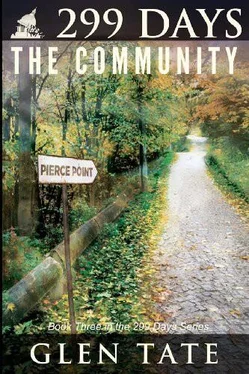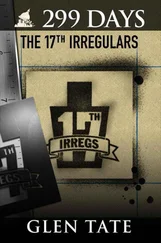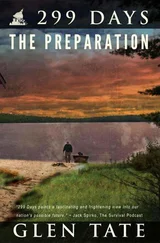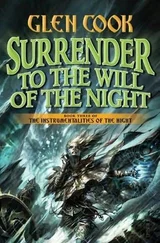Mary Anne told Mrs. Roth about the Matson family coming out with the Team. She had a hard time describing exactly what the Team was, so, realizing now that Mrs. Roth had lived through World War II, she said the men were kind of like soldiers. Mary Anne also told Mrs. Roth that Lisa Matson was a doctor. “I’ll ask her to come by and see you,” she said. Mrs. Roth nodded.
There was a pause. Knowing that she had come over for a reason, Mrs. Roth asked Mary Anne, “What can I do for you?”
Mary Anne was a little uncomfortable asking for something and hesitated for a moment. “Well, we have all those people living in the cabins on Over Road, like the team of young soldiers in the yellow cabin. We need to feed them. I am gardening and there are those apples everywhere that just rot each year. I am going to put up all the food I can, just like when I was a girl.”
Mrs. Roth smiled. People were going to be canning again. It was about time. All this fast food and relying on the grocery store for everything never made any sense to her.
“Oh, I have so many canning supplies I can’t keep track of them,” Mrs. Roth said. “They’re in the shed. You can have them if you’d like. I can’t stand long enough to can, anymore.”
“Oh, that would be great, Mrs. Roth,” Mary Anne said. “Just great. That’s what I came to ask you about.” Mrs. Roth was making her feel less and less guilty about asking for the canning supplies.
“Oh, certainly honey,” Mrs. Roth said. “I probably have ten cases of wide mouths and about the same number of pint jars. I have cases of regular lids. I got them fifteen years ago, but they never go bad. I thought I would can for everyone but no one wanted home canned food.” She chuckled. “They do now, though!”
Mrs. Roth’s eyes lit up. “I also have cases of those Tattler reusable canning lids. I got them in the 80s, a little while after they first came out. I never threw them out. I just knew that someone could use them. After living through the Depression, it’s hard for me to throw things out.”
Tattler lids? Mary Anne was euphoric. Unlike regular canning lids, which usually could not be reused a second time, Tattler lids could be used dozens of times. So could canning jars, making Tattler lids an absolute gold mine.
“That would be so generous, Mrs. Roth,” Mary Anne said. “We could really use them. We could also use some canning recipes. Could you share some with us?” Mary Anne knew the answer.
Mrs. Roth’s eyes lit up again. “Oh, yes, dear. I would be thrilled to share my recipes.” She realized that this would be one of the ways she could live on down on earth even after she was gone. People would talk for decades about “Mrs. Roth’s canned stew” and “Mrs. Roth’s apple butter.” She could tell Mary Anne the stories about her family and how the recipes came about. This was the best thing that had happened to her in years. She was so happy. She felt renewed. It was making the prospect of her approaching death that much easier.
“Let’s start by having you go out into the shed and inventory what I have,” Mrs. Roth said. “Then we can start on the recipes. I have a book of canning recipes and some up here,” she said, pointing to her head. “You can write them down. My mind is still sharp. I can give them to you by memory. And I might share a story or two about them.”
“That would be great,” Mary Anne said. She wanted to hear Mrs. Roth’s stories. She could tell that this was one of the best days Mrs. Roth had had in many years. And everyone would benefit from the canning recipes and, especially, from the supplies.
Mary Anne was stunned at how many canning supplies Mrs. Roth had. She had eleven cases of quart jars. With twelve in a case, that was a lot of jars; enough for many families each year. She also had nine cases of pint jars, also twelve to a case.
Mrs. Roth also had almost ten pounds of paraffin wax. Mary Anne knew that for some things, especially jams and jellies, she could melt about a quarter inch of wax on top of the jar and seal it that way, without having to use a canning lid. Wax could be reused to stretch it even further. Mrs. Roth had enough paraffin for lots and lots of jams and jellies; more than the families on Over Road probably would eat in a year.
Another prize was Mrs. Roth’s stores of pectin, which would allow Mary Anne to make jams and jellies that would gel instead of being runny. Mrs. Roth had Pomona pectin, which had a longer shelf life than regular pectin. This was important because Mrs. Roth's pectin was about fifteen years old; regular pectin would not be guaranteed to be effective over this period, but Pomona would. Also, Pomona pectin worked with lower sugar content jams and jellies and, with sugar being as scarce as it probably would be soon, that would be a good thing. Another amazing find in Mrs. Roth’s storage shed!
Mrs. Roth also had two twenty-one-quart All American canners; the ones that sealed without a rubber gasket, like the kind Mary Anne got at the farm supply store that week. Now, with Mrs. Roth’s canners, Mary Anne actually had more canners than they needed, but she could give the extras to others who needed them.
Mrs. Roth also had a well-worn copy of the Ball Blue Book of canning recipes, which would be great for people like Mary Anne and Eileen who hadn’t canned in a while.
The final prize was the boxes of Tattler canning lids. They were absolutely spectacular. Mary Anne counted the number of Tattlers. There were 365 of them. One for each day of the year, she thought.
“Mrs. Roth, you are literally saving our lives,” Mary Anne said, trying to choke back a tear.
“I know,” Mrs. Roth said with a smile. Then she got choked up, too. “But you’re saving mine. Making it meaningful here at the end. I’m more grateful to you than you are to me. Thank you so much for asking for my help. Thank you.” They both cried; joyous crying.
In that moment, Mary Anne realized that modern American culture did not value older people. That was over, though, now that modern America had collapsed. All across America that very morning, hundreds of thousands of people like Mary Anne and Mrs. Roth were probably having that same conversation. Younger people were getting skills from the older people. Older people were receiving a well-deserved purpose and pride by sharing those skills. Perhaps it was one of the few positives coming out of the whole mess.
Chapter 98
No Kings
(May 9)
After talking to Lisa about his new job and assuring her how safe he would be, Grant only had a little while before he had to go back for the 7:00 meeting at the Grange.
Grant and the Team would go early to get ready for the meeting; it would be an important one. There would be more people at this meeting than the one the night before; they met people all that day who said that they hadn’t been to the first meeting, but would be coming that night. The Team would be introduced by Rich and—Grant felt like he’d said this to himself a hundred times in the past few days—first impressions were everything. The residents of Pierce Point had to trust the Team and want their help.
Grant was still elated that Lisa had agreed to be a doctor out there. Part-time, of course. He knew that “part-time” would become full-time very quickly. He was happy for three reasons. First, it anchored Lisa into Pierce Point. She had a purpose to be out there. It would be harder for her to wish things were fine and that she could go back to Olympia when she had patients to see. Second, she would save lives out there. There was no question about it. She regularly saved lives when she was in a fully stocked ER, but out there, with primitive conditions, her knowledge would save even more lives.
Читать дальше











